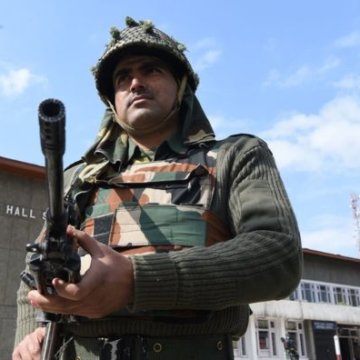- About
- Topics
- Picks
- Audio
- Story
- In-Depth
- Opinion
- News
- Donate
- Signup for our newsletterOur Editors' Best Picks.Send
Read, Debate: Engage.
Admittedly, it's not the best title, but this article has been called something deliberately banal - something dull and descriptive for an uneventful thing. By-elections are normally not anything special, but the one which took place yesterday has left six people dead, and many more injured.
Protestors stormed polling stations in the Srinagar district, causing damage to electronic voting machines and other equipment - but it has not emerged whether they directly injured any other citizens. Paramilitary forces (an extra 20,000 Indian troops were deployed to the region for the election - just to give you an idea of what is at stake during a Kasmiri by-election) then opened fire on the crowds in several separate areas. They used bullets and shotgun pellets to fire into crowds of protestors - leaving six people dead.
The protestors were challenging Indian-rule - a decades long struggle for millions of Kashmiris, who feel more closely aligned with Pakistan. The division of the region into Indian- and Pakistani-administered zones has been a point of high controversy since India achieved independence and Pakistan was created in 1947. Indeed, the first war between the nations took place in 1947 and was precipitated by the problem of Kashmir's sovereignty. Since then, two other wars have been fought over the region.
A by-election therefore, is not a banal issue.
Kashmiri separatists are diverse in their aims; With many favouring handing over control of the region to Pakistan, and others seeking to create a totally independent state. In some sense however, the region is more than a flashpoint between two nuclear nations (and potentially three, since China administers a third, smaller portion of Kashmir) - but it represents the classic conflict of our time: How does identity shape politics?
Identity politics might have come to denote 'micropolitics' and 'structural bias', and related concepts, but in many parts of the world, identity politics is politics. It is the entire way in which politics is conceived - from Northern Ireland to Northern India, the ways in which people come to understand and relate to history shapes the entire way they think about the future. This is why people who do not want to be politically aligned with India fight against it - they see a history of oppression, of religious intolerance and exclusion: Not the multicultural paradise India projects itself as. Some more troubling news might be that India has recently hardened in its attitudes towards political expression, with Modi's Far-Right party in charge. The flashpoint of Kashmir will ignite again, and it will be caused by an argument over who we are, and who we want to be.
Image: Getty/ BBC
